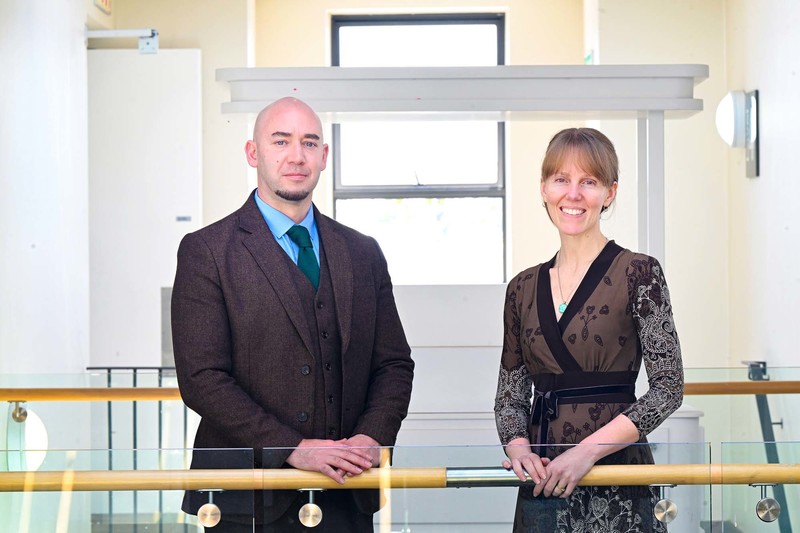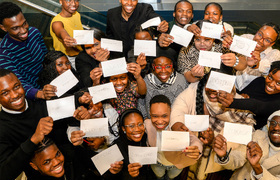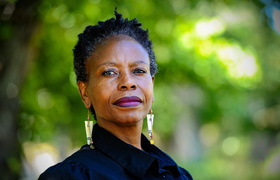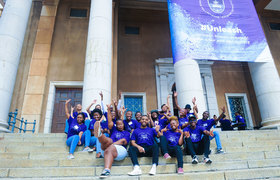UCT launches Centre for Wellbeing and Flourishing
23 September 2025 | Story Myolisi Gophe. Photos Lerato Maduna. Voice Cwenga Koyana. Read time 6 min.
The University of Cape Town (UCT) has taken a bold step in redefining the role of higher education in advancing staff and student wellbeing by placing human flourishing at the heart of its institutional mission.
Recently, the university hosted the inaugural Wellbeing and Flourishing Conference at its Graduate School of Business (UCT GSB), an event that not only marked a watershed moment for UCT but also launched the Centre for Wellbeing and Flourishing.
The conference, themed around embedding wellbeing in the fabric of university life, drew together scholars, practitioners, staff, and students from across South Africa and abroad. It reflected UCT’s growing recognition that academic excellence and transformation cannot be separated from the holistic wellbeing of its community.
Professor Elelwani Ramugondo, deputy vice-chancellor for Transformation, Student Affairs and Social Responsiveness, described the conference as the start of something deeply transformative for UCT.
In her recorded message that was relayed at the conference (she was chairing another institutional event during the conference), she said: “I know this is a baby that we are giving birth to here at UCT with a lot of excitement and anticipation. We have grown to appreciate that student success, staff wellbeing, and flourishing are everybody’s business.”
For Professor Ramugondo, flourishing extends beyond conventional notions of wellness. It involves dignity, belonging, meaning, and accomplishment – values that are often compromised in the face of inequality and societal dysfunction. “Our villages are in distress for many reasons, including failures in service delivery, and our young people grow up in places where they do not feel their dignity is affirmed. As a university, we cannot ignore those realities.”
She stressed that flourishing is not simply about the avoidance of failure but also about resilience, courage, and collective responsibility. “Sometimes success comes from failure, when students recognise when they need help and reach out to their peers and staff. At UCT, student success is non-negotiable, but it is inseparable from staff flourishing, too. When staff feel that they belong at UCT, supported by an institutional culture that sees their humanity, then UCT succeeds.”
Building a community of practice
The vision for the centre and the conference grew out of UCT’s Residence Academic Development Committee, which for years has championed living-and-learning programmes for UCT’s 7 000-strong residence community. Sean Abrahams, specialist for learning and innovation in the Department of Student Affairs (DSA) and founding strategic lead for the centre, traced the origins of the initiative to a critical conversation a year ago.
“At the time, Professor Ramugondo challenged us to think strategically about wellbeing,” he recalled. “There were already pockets of practice across the university – research on sleep, interventions for disability inclusion, programmes for resilience – but they were happening in silos. The question was: how do we connect these efforts, learn from one another, and take UCT’s Vision 2030 goal of unleashing human potential seriously? The answer was a dedicated centre and a conference to bring everyone together.”
Abrahams, whose PhD research explores the role of “grit” – passion and perseverance for long-term goals – in higher education, has long been passionate about reducing dropout rates and fostering resilience. For him, the conference was proof that UCT is ready to shift from isolated interventions to systemic change.
Despite modest advertising, the conference exceeded expectations. More than 20 abstracts were presented in a fast-paced format, covering topics from wellbeing and sleep to flourishing in disability support programmes. Participants spanned generations and disciplines: first-year students, PhD candidates, faculty staff, practitioners from Stellenbosch and the University of the Western Cape (UWC), and even alumni from Wake Forest University in the United States of America.
“It was intergenerational, multidisciplinary, and global,” said Abrahams. “We thought it would just be a teaching-and-learning space, but it turned into something much bigger. People flew in, and for many, it was the first time they had permission to bring their work on flourishing into an academic forum. That, in itself, was powerful.”
For participants, the most significant outcome was the chance to engage in what Abrahams called “radical listening”. “We listened deeply to each other’s perspectives on wellbeing and flourishing,” he said. “But one day was not enough. People wanted more time and more engagement. Clearly, this will need to grow into an annual conference with workshops and parallel sessions.”
“We’ve set the tone that flourishing is not a luxury or an add-on; it is central to what it means to be a university on this continent.”
Continental impact
The ripple effects are already being felt. Abrahams revealed that other South African universities have expressed interest in replicating the model. UCT has also been invited to co-host the upcoming African Positive Psychology Conference, which will bring a uniquely African vision to the global scholarship on wellbeing.
“This is first-mover advantage for UCT,” Abrahams explained. “We’ve set the tone that flourishing is not a luxury or an add-on, it is central to what it means to be a university on this continent.”
Plans are also underway to establish a network or fellowship programme through the new centre, enabling staff, students, and partners to collaborate across disciplines and institutions. This will ensure that the momentum from the inaugural gathering translates into long-term impact.
For Abrahams, the ultimate goal is not just individual well-being but collective flourishing.
“Trauma, healing, redress, and transformation are fundamental ingredients,” said Abrahams. “This is not just about students, but about the entire community. We need to think about what it means to flourish together – to move towards interpersonal flourishing.”
 This work is licensed under a Creative Commons Attribution-NoDerivatives 4.0 International License.
This work is licensed under a Creative Commons Attribution-NoDerivatives 4.0 International License.
Please view the republishing articles page for more information.
























